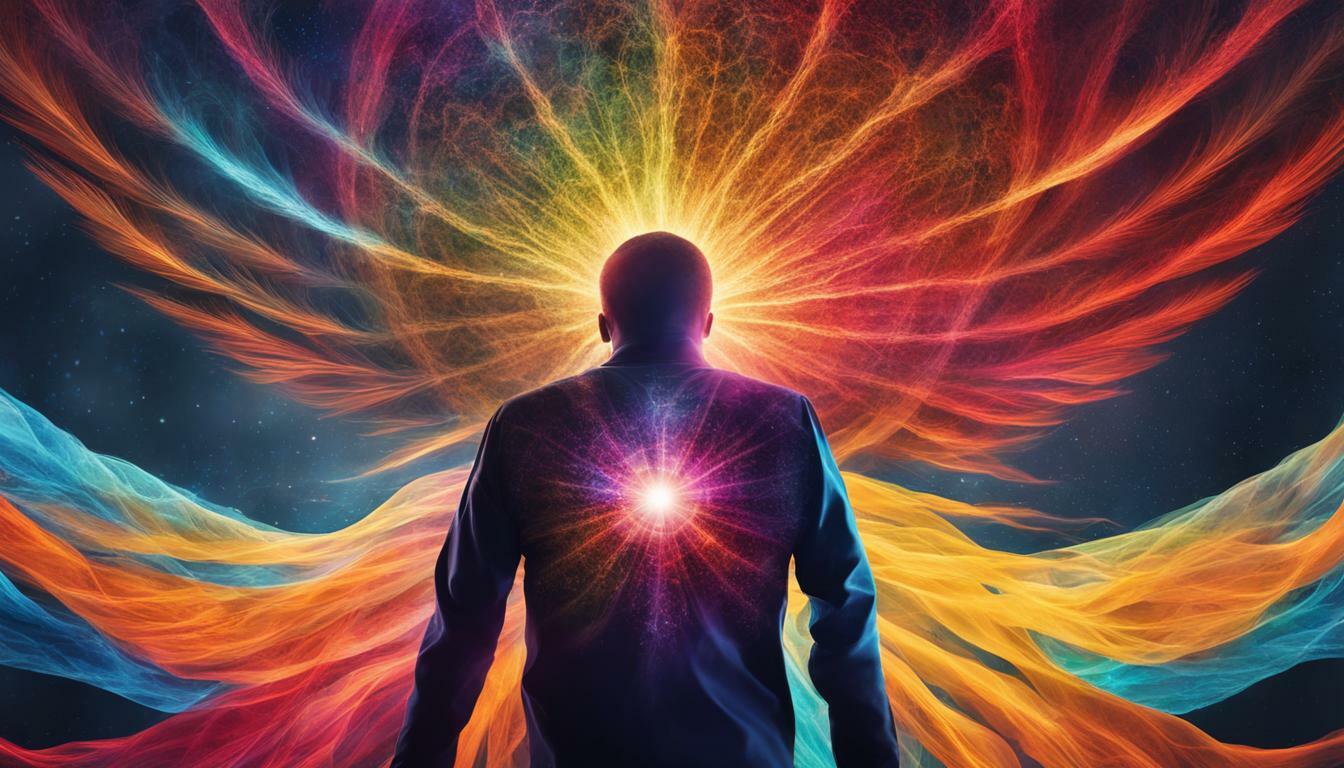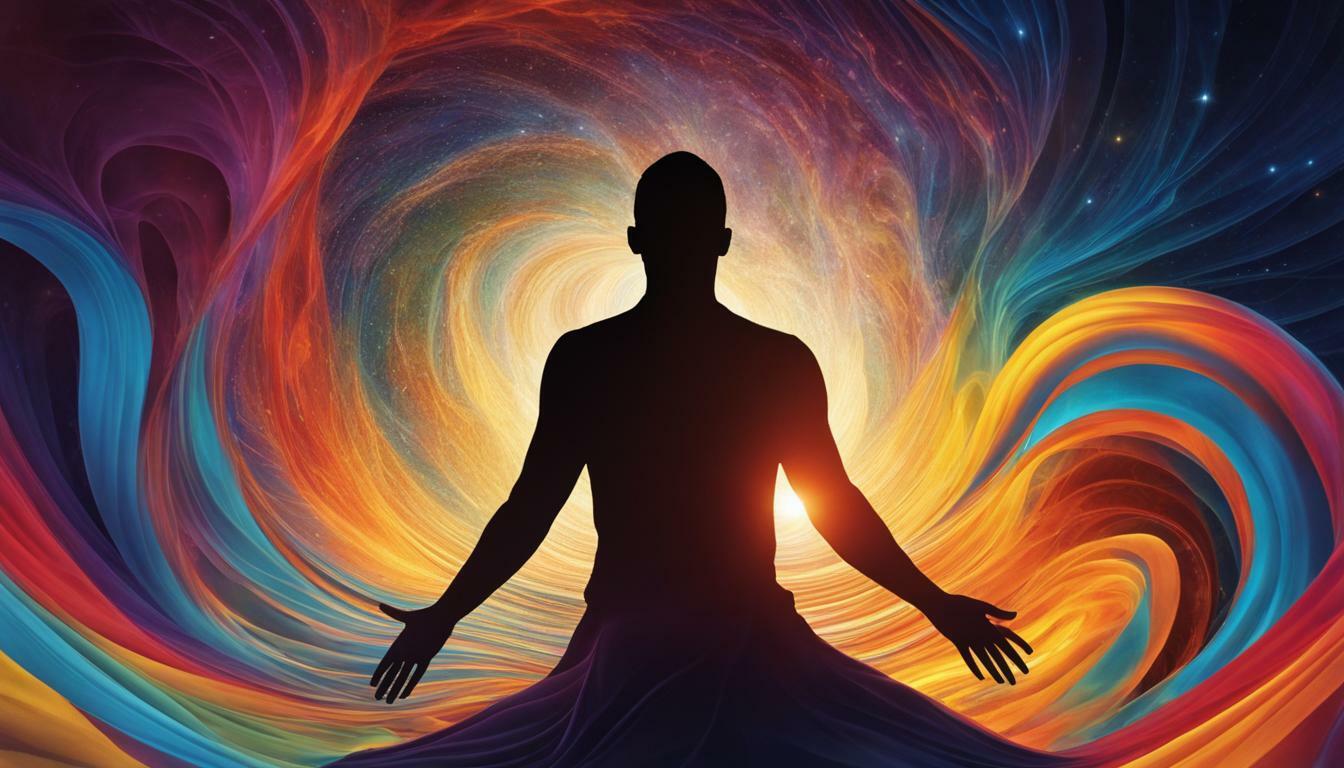
Overcoming addiction with energy medicine offers a holistic approach to addiction recovery by addressing and clearing toxic energy imprints in the luminous body. The energy body, also known as the luminous body, is a field of atomic energy that contains information vital to one’s physical, mental, and emotional health. Trauma, abuse, and addiction create imprints in the luminous body, which can lead to disrupted regulation of the body and mind. Energy healing, such as Reiki therapy, aims to cleanse the luminous field and restore harmony to the system. Reiki therapy can help individuals recover from addiction when combined with other treatment modalities. It can alleviate withdrawal symptoms and promote relaxation and calmness during the early stages of recovery. While there is no scientific proof of energy being transmitted from practitioner to receiver, many individuals report positive shifts in energy and lifestyle changes after receiving Reiki therapy.
Key Takeaways:
- Energy medicine offers a holistic approach to addiction recovery.
- Addressing and clearing toxic energy imprints in the luminous body is crucial in overcoming addiction.
- The energy body, also known as the luminous body, plays a significant role in physical, mental, and emotional health.
- Trauma, abuse, and addiction create imprints in the luminous body, which can disrupt the body and mind’s regulation.
- Reiki therapy is a form of energy healing that aims to restore harmony to the system.
The Power of Energy Medicine in Addiction Recovery
Energy medicine is a powerful tool in addiction recovery, offering a holistic approach that addresses the root causes of addiction and promotes natural remedies for healing. In addiction recovery, it is essential to not only focus on the physical symptoms but also address the underlying imbalances in the mind, body, and spirit. By working with the body’s energy systems, energy medicine can help restore balance and provide a foundation for lasting recovery.
One of the key aspects of energy medicine is its ability to clear toxic energy imprints in the luminous body, also known as the energy body. The luminous body is a field of atomic energy that holds vital information for our overall well-being. Trauma, abuse, and addiction can create imprints in this energy field, disrupting the regulation of the body and mind. Energy healing modalities, such as Reiki therapy, aim to cleanse and restore harmony to the luminous body, facilitating the healing process.
Reiki therapy, in particular, can play a significant role in addiction recovery. When combined with other treatment modalities, Reiki therapy can help individuals overcome addiction by alleviating withdrawal symptoms and promoting relaxation and calmness during the early stages of recovery. While there is no scientific proof of energy being transmitted from practitioner to receiver, many individuals report positive shifts in energy and lifestyle changes after receiving Reiki therapy.
Energy medicine offers a unique and complementary approach to addiction recovery. It focuses on the individual as a whole, taking into account the interconnectedness of the mind, body, and spirit. By addressing the energetic imbalances and clearing the luminous body, energy medicine can support individuals on their recovery journey, promoting lasting healing and well-being.
Understanding the Luminous Body and its Impacts on Addiction
To truly understand addiction and its effects, it is essential to explore the concept of the luminous body and its profound impacts on the mind and body during addiction. The luminous body, also known as the energy body, is a field of atomic energy that surrounds and interpenetrates the physical body. It is composed of various energy centers, commonly referred to as chakras, and channels known as meridians. This energetic system plays a crucial role in maintaining our overall health and well-being.
During addiction, the luminous body can become imprinted with toxic energy, resulting from trauma, abuse, and the addictive behaviors themselves. These imprints disrupt the smooth flow of energy within the system, leading to imbalances in the physical, mental, and emotional aspects of a person’s life. This disruption can perpetuate the addictive cycle and hinder the recovery process.
Complementary and alternative medicine approaches, such as mind-body medicine, address these imprints in the luminous body. Mind-body medicine recognizes the interconnectedness of the mind, body, and spirit and uses various techniques to promote healing and restore balance. These techniques may include meditation, breathwork, acupuncture, and energy healing modalities like Reiki therapy.
The Role of Mind-Body Medicine in Addiction Recovery
Mind-body medicine approaches, including complementary and alternative medicine, offer valuable tools for individuals in addiction recovery. By addressing the imprints in the luminous body, these modalities can help to regulate and balance the energy flow. This can support individuals in overcoming cravings, managing stress and anxiety, and promoting overall well-being.
| Mind-Body Medicine Techniques | Benefits |
|---|---|
| Meditation | Reduces stress, enhances self-awareness, promotes emotional stability |
| Acupuncture | Helps restore energy flow, reduces pain, supports emotional release |
| Energy Healing, like Reiki therapy | Cleanses the luminous body, promotes relaxation, aids in emotional healing |
These mind-body medicine techniques can be used in conjunction with traditional addiction treatment approaches to enhance and support the recovery process. While there may not be scientific proof of energy being transmitted from practitioner to receiver, many individuals report positive shifts in energy and lifestyle changes after receiving Reiki therapy and other energy-based interventions.
The Role of Reiki Therapy in Addiction Recovery
Reiki therapy plays a significant role in addiction recovery, offering energy-based interventions and incorporating principles of energy psychology to facilitate healing and transformation. It is a complementary and alternative medicine practice that aims to restore balance and promote overall well-being. Reiki therapists work with the client’s energy field, channeling universal life force energy to clear blockages and promote harmony within the body and mind.
When it comes to addiction recovery, Reiki therapy can be a powerful tool. It helps individuals cleanse their luminous body, which contains vital information for physical, mental, and emotional health. Trauma, abuse, and addiction can imprint toxic energy on the luminous body, disrupting its regulation and leading to imbalances. By addressing these imprints through Reiki therapy, individuals can experience profound shifts in their energy and gain a sense of inner peace and clarity.
During the early stages of addiction recovery, Reiki therapy can provide valuable support. It can alleviate withdrawal symptoms and promote relaxation and calmness. Reiki therapists work alongside other treatment modalities to offer a holistic approach to healing. While there is no scientific evidence of energy being transmitted from practitioner to receiver, many individuals report positive changes in their energy and lifestyle after receiving Reiki therapy.
Personal Experiences with Reiki Therapy
“Reiki therapy has been an integral part of my addiction recovery journey. It has helped me release trapped emotions and restore balance to my energy field. I feel lighter, more grounded, and better equipped to face the challenges of recovery. Reiki has truly been a transformative experience for me.” – John, in addiction recovery.
Reiki therapy offers hope and healing for individuals struggling with addiction. It provides a safe and nurturing space for individuals to explore their inner selves and tap into their innate healing abilities. By working with the energy body, Reiki therapy supports the overall well-being of individuals on their path to recovery.
| Benefits of Reiki Therapy in Addiction Recovery |
|---|
| Alleviates withdrawal symptoms |
| Promotes relaxation and calmness |
| Restores balance and harmony to the energy field |
| Enhances clarity and emotional well-being |
| Supports overall physical, mental, and emotional healing |
Benefits of Reiki Therapy in Addiction Recovery
Reiki therapy offers a range of benefits in addiction recovery, providing integrative therapies that alleviate withdrawal symptoms, promote relaxation, and facilitate energy healing for holistic recovery. As an energy-based intervention, Reiki therapy aims to cleanse the luminous field and restore harmony to the system, addressing the toxic imprints created by trauma, abuse, and addiction.
During the early stages of recovery, individuals often experience challenging withdrawal symptoms. Reiki therapy can help alleviate these symptoms by promoting relaxation and reducing anxiety. By focusing on the energy centers of the body, known as chakras, Reiki practitioners can help restore balance and stability to these vital energy centers, leading to a greater sense of calmness and well-being.
Furthermore, Reiki therapy facilitates energy healing, promoting the body’s natural ability to self-heal and rebalance. It can help release stagnant energy and emotional blockages, allowing individuals to address the underlying issues that contribute to addiction. By working on the energetic level, Reiki therapy complements other treatment modalities, supporting the overall healing process.
While the scientific community may not fully understand or acknowledge the mechanisms behind Reiki therapy, many individuals report positive shifts in their energy and lifestyle after receiving sessions. Reiki therapy can be a valuable addition to an addiction recovery program, offering a holistic approach that addresses not only the physical symptoms but also the emotional and energetic imbalances that contribute to addiction.
| Benefits of Reiki Therapy in Addiction Recovery |
|---|
| Alleviates withdrawal symptoms |
| Promotes relaxation and reduces anxiety |
| Facilitates energy healing and rebalancing |
| Supports holistic recovery |
Personal Experiences and Success Stories with Energy Medicine for Addiction
Real stories of hope and transformation demonstrate the power of energy medicine in addiction recovery, showcasing the tremendous impact of complementary and alternative medicine on individuals’ healing journeys. Overcoming addiction with energy medicine involves addressing and clearing toxic energy imprints in the luminous body, also known as the energy body. This field of atomic energy contains vital information that influences our physical, mental, and emotional well-being.
Trauma, abuse, and addiction create imprints in the luminous body, disrupting the regulation of the mind and body. Energy healing, such as Reiki therapy, aims to cleanse the luminous field and restore harmony to the system. Many individuals have found that combining Reiki therapy with other treatment modalities has helped them recover from addiction.
During the early stages of recovery, Reiki therapy can alleviate withdrawal symptoms and promote relaxation and calmness. While scientific proof of energy transmission from practitioner to receiver is still debated, the positive shifts in energy and lifestyle changes reported by many individuals after receiving Reiki therapy cannot be ignored.
These personal experiences and success stories are a testament to the effectiveness of energy medicine for addiction recovery. They highlight the transformative potential of complementary and alternative medicine, providing hope and inspiration for individuals on their healing journeys.
FAQ
How does energy medicine help in overcoming addiction?
Energy medicine addresses and clears toxic energy imprints in the luminous body, which can disrupt the regulation of the body and mind. By cleansing the luminous field, energy healing promotes harmony and supports addiction recovery.
What is the luminous body and how does it impact addiction?
The luminous body, also known as the energy body, is a field of atomic energy that contains vital information for physical, mental, and emotional health. Trauma, abuse, and addiction create imprints in the luminous body, leading to disrupted regulation of the mind and body.
Can Reiki therapy help in addiction recovery?
Yes, Reiki therapy can be a valuable tool in addiction recovery when combined with other treatment modalities. It can alleviate withdrawal symptoms, promote relaxation, and contribute to a sense of calmness during the early stages of recovery.
Is there scientific proof of energy being transmitted during Reiki therapy?
While there is no scientific proof of energy being transmitted from practitioner to receiver, many individuals report positive shifts in energy and lifestyle changes after receiving Reiki therapy.
What are the benefits of Reiki therapy in addiction recovery?
Reiki therapy can help alleviate withdrawal symptoms, promote relaxation and calmness, and support holistic healing during addiction recovery. It is an integrative therapy that can complement other treatment approaches.
Are there personal experiences and success stories with energy medicine for addiction?
Yes, many individuals have shared their personal experiences and success stories with energy medicine, including Reiki therapy, in addiction recovery. These stories highlight the positive impact of energy medicine and its role in supporting holistic healing.



